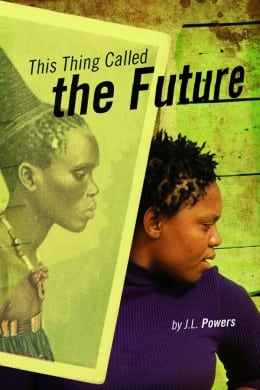 I have the great pleasure to introduce J.L. Powers and her wonderful book This Thing Called the Future. I saw several drafts of this story and am so glad to see it in print. Powers’ books are exactly what I enjoyed reading as a young adult. She tackles the tough questions and makes her readers think.
I have the great pleasure to introduce J.L. Powers and her wonderful book This Thing Called the Future. I saw several drafts of this story and am so glad to see it in print. Powers’ books are exactly what I enjoyed reading as a young adult. She tackles the tough questions and makes her readers think.
AOB: What is the title of your book?
JL Powers: This Thing Called the Future
AOB: Where is it set?
JL Powers: ost-apartheid South Africa
AOB: In 70 words or less, provide a succinct plot description of your story.
JL Powers: Set in modern-day South Africa, the story follows Khosi, a 14-year-old girl faced with a slew of extraordinary circumstances: falling in love, getting stalked by a shapeshifter, a local witch targeting her and her family for extinction, and losing a loved one to AIDS.
AOB: How are you connected to the setting of your story?
JL Powers: I first traveled to Africa by mistake when I was 19. I had intended to work with street gangs in New York but the agency I applied to work with decided to send me to Kenya instead, to work with street kids. I fell in love with the continent and ended up earning two graduate degrees in African history. At some point, I settled on South Africa as my main region of interest, and the Zulu people as the people I wanted to get to know and learn about their history. So I learned Zulu and spent time living in South Africa with local Zulu families.
AOB: What inspired you to write this story?
JL Powers: While I was living in South Africa, I found myself fascinated with several aspects of life there that were truly different from American life. I became fascinated with how involved traditional healers (sangomas) were in people’s medical problems. They are so involved, and so common, that some AIDS organizations work with sangomas to make sure that HIV-positive people are taking their anti-retroviral medications, the medicines that keep HIV-positive people alive. I found that really interesting. I decided to write the book when three things became absolutely fascinating to me: 1) the fact that many people are more likely to seek medical treatment from a sangoma than a medical doctor (or they will seek treatment from both a sangoma and a doctor at the same time); 2) the problem of witchcraft; and 3) how common it is for older men to have young girls as girlfriends (they are called sugar daddies).
AOB: What was the biggest challenge you had writing your story? How did you overcome it?
JL Powers: Because I am not African, it isn’t easy for me to always understand the spiritual point of view from which an African young girl approaches the world. My character sees the spiritual world; her ancestors—that is, her dead grandfather in particular—speak to her out loud and also make appearances in her dreams that end up having consequences in real life; a witch has put a curse on her and her family. I really had to submerge my own grew-up-in-a-Christian-family-am-now-an-American-agnostic world view in order to write it.
AOB: What other YA/MG books have you written? Are any of them set outside of the United States? If so, which ones and where? What are these stories about?
JL Powers: My first novel, The Confessional, is set on the U.S.-Mexico Border. It’s something of a murder mystery, though it also delves deeply into the racial politics of the Border, where Mexicans are seen as inferior, even by many Mexican-Americans. It is a story of faith, friendship, and violence, and follows a very brief (4 day) period in the lives of six young men whose friend gets murdered in what appears to be a racially motivated event.
 AOB: What kind of story can we expect next from you? Is it set outside of the United States? If so, where? And what is it about?
AOB: What kind of story can we expect next from you? Is it set outside of the United States? If so, where? And what is it about?
JL Powers: Actually, I am currently working on a psychothriller set in New Mexico.
AOB: What else would you like us to know about you or your story?
JL Powers: I love that it’s being called an alternative fantasy! But even though I love that, I want to remind readers that it’s just the way people live in South Africa—it isn’t magical realism, it’s just reality.
AOB: Can you remember the first book that made an impact on you? And why?
JL Powers: The first book that made an impact on me was the first book I remember reading by myself. It was a picture book biography of Harriet Tubman, an escaped slave from the American South known as “Moses” to her people because she kept returning and helping more slaves escape to Canada via the “Underground Railroad.” Not only was I proud of reading it all by myself, but Tubman’s story captured both my creative imagination and my moral imagination. I think it’s no surprise, therefore, that I gravitate towards books with real depth and meaning, so-called “serious” literature.
For more information about J.L. Powers and other books she has written, click here.
Thank you for joining us J.L. Powers! We look forward to your next book!


